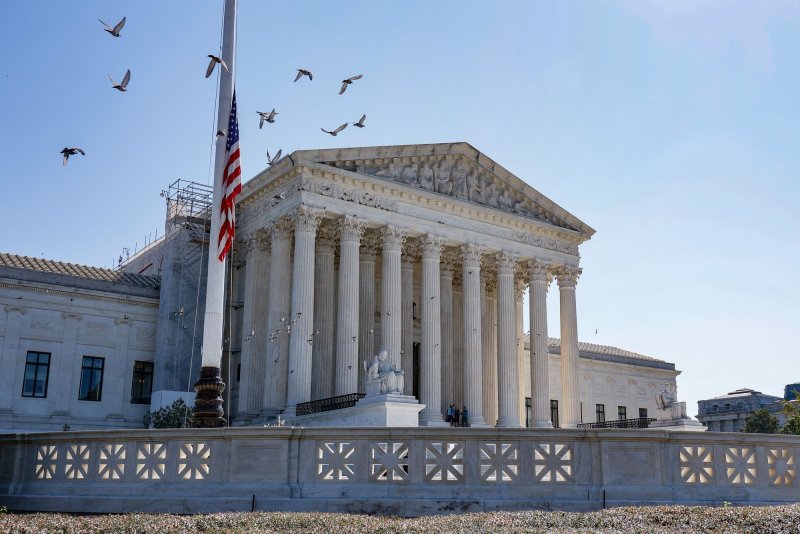1 of 3 | The Supreme Court on Friday heard oral arguments on the law to force TikTok’s parent company to divest from the platform or face a ban in the United States. File Photo by Jemal Countess/UPI |
License PhotoJan. 10 (UPI) — U.S. Solicitor General Elizabeth Prelogar told the U.S. Supreme Court Friday that President-elect Donald Trump could ignore the ban of TikTok if he chooses.
During oral arguments before the high court, Prelogar initially said she did not wish to speculate on whether Trump could extend the deadline of the TikTok ban, set to take place Jan. 19. Trump will not yet be sworn in as president as his inauguration takes place Jan. 20.
Prelogar later said Trump could “absolutely” decide to ignore enforcing the law. If the ban does take effect, it could be lifted and TikTok would be allowed to return at a later time if a qualified divestiture is made.
“At the outset of course Congress was hoping to prompt a divestiture,” Prelogar said. “Foreign adversaries do not willingly give up their control of this mass communications channel in the United States. Congress expected we might see something like a game of chicken. But when push comes to shove and these restrictions take effect — it will fundamentally change the landscape for what ByteDance is willing to consider and might be just the jolt Congress expected the company would need to actually move forward with the divestiture process. So it’s not irrevocable.”
The hearing adjourned after about two hours as scheduled. Justices on both sides shared skepticisms about TikTok attorney Noel Francisco’s argument that Congress’ ban is an unconstitutional First Amendment violation. They said Congress means to remove any possible influence on the app by the People’s Republic of China, not influence the content or speech on the app itself.
Francisco argued that the law was a ban on the speech itself and noted that other media companies operating in the United States, including Politico, are owned by foreign entities. Politico is owned by German company Axel Springer SE. TikTok, on the other hand, is a “bona fide U.S. company,” he said.
If the law takes effect, Francisco said he is of the understanding that TikTok will go dark on Jan. 19. It will no longer appear in app stores and service providers will discontinue their work with the, rendering it non operational.
“Am I right that the algorithm is the speech here,” Justice Amy Coney Barrett asked.
“The algorithm is a lot of things,” Francisco responded. “It’s basically how we predict what our customers want to see.”
Francisco said that TikTok could choose to abandon the algorithm, owned by ByteDance, that makes TikTok’s user experience unique. However it would be an “incredibly bad business decision.” He added that it is also doubtful TikTok would do this.
Barrett explained further about connecting the algorithm to speech, describing it as being similar to editorial discretion. She noted that editors in news organizations use their discretion or make decisions about how content is presented and what content is presented for mass consumption. This, she said, is similar to how TikTok’s algorithm decides what content its users see.
Justice Samuel Alito and Francisco earlier agreed that the court has never ruled that foreign entities have First Amendment protections in the United States. Barrett reasoned that the TikTok algorithm’s decision about what content is shown is an expression of ByteDance’s speech.
“Here the concern is about the covert content manipulation piece of the algorithm,” she said. “That is something that ByteDance wants to speak, right?”
Francisco argued that TikTok and ByteDance “absolutely resist any content manipulation by China.”
“In 10 days, TikTok wants to speak,” Francisco said. “In 10 days, TikTok cannot speak if ByteDance doesn’t execute a qualified sale.”
Jeffrey Fisher, attorney for TikTok content creator Brian Firebaugh, said the government’s national security concern is not reason enough to ban speech.
“It’s not enough to say ‘national security,'” he said. “You have to say what is the real harm.”
Fisher argued that much of the government’s concern is based on hypothetical future scenarios, something that Justice Ketanji Brown Jackson later alluded to.
“Congress is fine with the expression,” said Chief Justice John Roberts. “They’re not fine with a foreign adversary gathering information about 170 million people on TikTok.”
Prelogar said the amount of data TikTok collects about U.S. users is “unprecedented.” Meanwhile, the way the algorithm works and the ways it can be used to influence those users is not apparent. Justice Elena Kagan contended that the way any social media algorithm works is not clear.
“Does covert just mean it’s hard to figure out how the algorithm works? Because we could say that about every algorithm,” she said. “It’s just because we don’t know that China’s behind it? That’s what covert means? Everybody knows China is behind it.”
Prelogar emphasized that the root of the issue that Congress means to solve with its law is to remove China’s involvement with TikTok, if it is to continue operating in the United States. The position of the government is that China will try to harm or weaken the United States with its alleged control of TikTok. The United States just may not know when or how, according to Prelogar.
“It’s not just narrowly tailored. It’s precisely tailored,” Prelogar said. “It’s trying to fix the thing that’s creating the problem which is the PRC’s involvement and the Chinese government’s ability to exercise this control over the corporate entities.”
